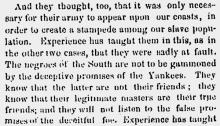THE SCHOOL OF EXPERIENCE.
The Yankees are engaged in learning a lesion in national affairs, which is likely to prove very costly to them. They believe that the South was full of Union men, and that, as the victorious armies of the North advance into the Cotton States, the “loyal” people would rise up, and welcome their “deliverers.” But the experience will teach them— indeed it has already taught them— that the only loyal people in the South are those who are loyal to the Confederate Government.
They thought, when the “Cotton States seceded, that seventy-five thousand men could crush out “the rebellion” in three months. The three months have passed, and five more have been added to them, and the “rebellion,” instead being “crushed,” has extended from the seven Cotton States t the six border States, and the work of subjugation is a far from accomplishment as when the proclamation calling out the $75,000 men for there month was issued.
And they thought, too, that it was only necessary for their army to appear upon our coasts, in order to create a stampede among our slave population. Experience has taught them in this, as in the other two cases, that they were sadly at fault. The negroes of the South are not to be gammoned by the deceptive promises of the Yankees. They know that the latter are not their friends; they know that their legitimate masters are their true friends, and they will not listen to the false promises of the deceitful foe. Experience has taught the Yankees this fact, and the New York Journal of Commence is constrained to admit the truth of it, as it is corroborated by several gentlemen, and to ass that “it is said that a visit to South Carolina has already open the eyes of many gentlemen of former abolition inclination to some few facts in slavery.”
As the war progresses, the eyes of the enemy will be open to more facts, and they will, in the end, grow to be wiser, if not better men, for “experience is a dear school, but ignorant people will learn in no other.”
"The School of Experience," Augusta (GA) Star, December 17, 1861, p. 2.

